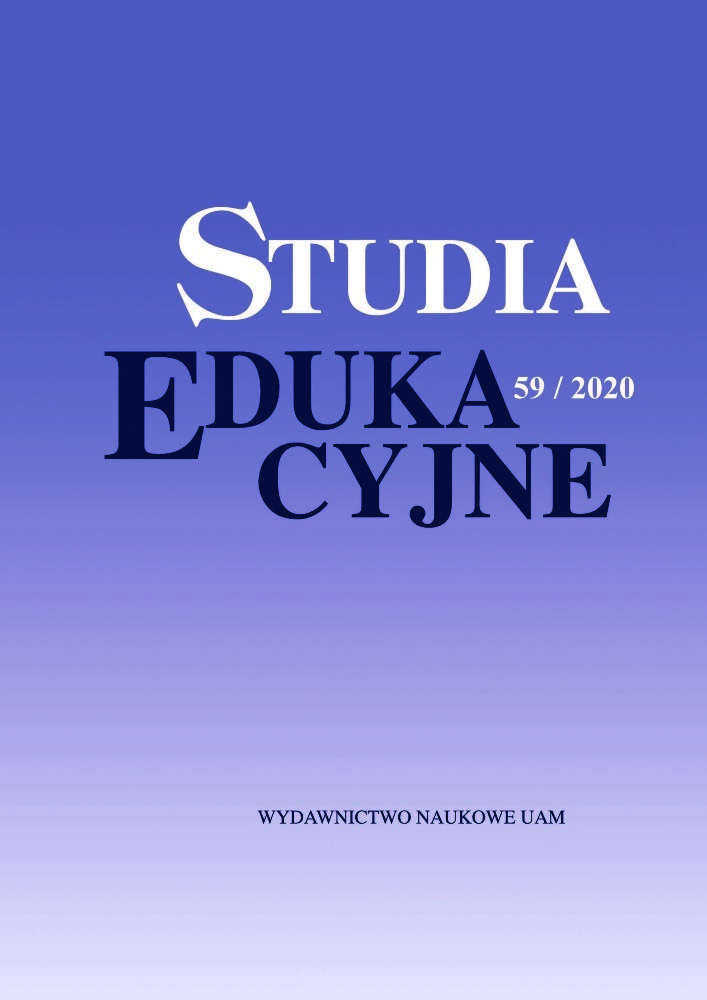Abstract
The purpose of the article is to contribute to the discussion about the relevance of existential issues in contemporary education. The analyses presented in the paper are related to the problems of self-reflection, self-questioning and the process of spiritual and moral development of human beings. Firstly, the author begins by depicting the meaning of human existence in the light of philosophy. What is at issue here is a question of being oneself, recognizing personal truth and finding one’s own voice as opposed to being inauthentic or fleeing from oneself. Special attention is paid to the language as an essential, constitutive element of being. Secondly, the article attempts to consider some educational implications resulting from the deep ontological relationship between human beings and language. Describing them, the author indicates that ignoring vital questions in language education contributes to spiritual vacuity in the lives of young people and reduces educational thinking merely to instrumental, pragmatic problems concerned with qualification and transfer of communicative skills.
References
Arendt H., Fernsehgespräch mit Günter Gaus, [in:] Ich will verstehen: Selbstauskünfte zu Leben und Werk, Piper Verlag, Munich (1964) 2005.
Beckett S., Texts for nothing, John Calder, London 1999.
Buber M., Between Man and Man, transl. by R.G. Smith, Collins, London (1947) 1961.
Carroll J.B., Human Cognitive Abilities. A Survey of Factor-Analytic Studies, Cambridge University Press, Cambridge 1993.
Collier V.P., Thomas W.P., Reforming education policies for English learners means better schools for all, The State Education Standard, 2002, 3(1).
Cummins J., The role of primary language development in promoting educational success for language minority students, [in:] Schooling and Language Minority Students: A Theoretical Framework, Evaluation, Dissemination and Assessment Center California State University, California State Department of Education, Los Angeles 1981.
Cummins J., BICS and CALP: Empirical and Theoretical Status of the Distinction, [in:] Encyclopaedia of Language and Education, volume 2, Eds. B. Street, N.H. Hornberger, Springer Science + Business Media LLC, New York 2008.
Dall`Alba G., Barnacle R., An ontological turn for higher education, Studies in Higher Education, 2007, 32(6).
Essen E., Bildung durch Sprachbewusstsein und sprachliches Gestalten, Peter Lang, Frankfurt am Main 2002.
Freire P., Giroux H., Pedagogy, Popular Culture and Public life: An introduction, [in:] Popular Culture, Schooling and Everyday Life (Critical Studies in Education), Eds. H. Giroux, R. Simon, Bergin & Garvey Publishers, Toronto 1989.
Gadamer H-G., Education is Self-Education, Journal of Philosophy of Education, 2001, 4(35).
Gadamer H-G., The Incapacity for Conversation, Continental Philosophy Review, (1972) 2006, 39.
Heidegger M., Poetry, Language, Thought, transl. by A. Hofstadter, Harper and Row, New York (1951) 1971.
Heidegger M., On the way to language, transl. by P. Hertz, J. Stambaugh, Harper and Row, New York (1959) 1971.
Heidegger M., Basic writings: From Being and Time (1927) to the Task of Thinking, transl. by D.F. Krell, Routledge, London (1964) 1978.
Heidegger M., Being and Time, transl. by J. Stambaugh, State University of New York Press, New York (1927) 2010.
Hellwig K., Sprachlich handeln- von Medium zu Medium. Prozessorientiert-kreatives Lernen im Englischunterricht durch Sprach-, Bild- und Musik-„Texte“, [in:] Probleme der Schreibentwicklung im Fremdsprachenunterricht, Ed. J. Iluk, Wydawnictwo Uniwersytetu Śląskiego, Katowice 1997.
Jaspers K., Way to Wisdom: An Introduction to Philosophy, transl. by R. Mannheim, Yale University Press, New Haven – London 1951.
Jaspers K., Philosophy, transl. by E.B. Ashton, University Press, Chicago (1932) 1969.
Jaspers K., On my own Philosophy, [in:] Existentialism from Dostoevsky to Sartre, Ed. and transl. by W. Kaufmann, Meridian, New York (1941) 1975.
Kierkegaard S., Either-Or, transl. by W. Lowrie, Doubleday, New York (1843) 1959.
Kierkegaard S., Fear and Trembling and Repetition, transl. by H.V. Hong, E.H. Hong, Princeton University Press, New Jersey (1843) 1983.
Levinas E., Totality and Infinity: An Essay on Exteriority, transl. by A. Lingis, Pennsylvania: Duquesne University Press, Pittsburgh 1969.
Michelman S., The A to Z of Existentialism, Plymouth: Scarecrow Press, Lanham, Toronto 2010.
Nussbaum M., Not For Profit. Why Democracy Needs the Humanities, Princeton University Press, Princeton – Oxford 2016.
Pavlenko A., Bilingual Selves, [in:] Bilingual Minds: Emotional Experience, Expression, and
Representation, Ed. A. Pavlenko, Clevedon, Bufallo, Multilingual Matters ITD, Toronto 2006.
Pestalozzi H., Schriften zur Menschenbildung, Birkhäuser, Basel (1857) 1946.
Reynolds J., Understanding Existentialism, Routledge, London – New York 2014.
Rumianowska A., Der Einsatz der Populärkultur im Fremdsprachenunterricht. Eine empirische Untersuchung am Beispiel von Musikvideoclips, Deutsch als Fremdsprache, 2009, 46(1).
Samway K., McKeon D., Myths and Realities. Best Practices for English Language Learners, Heinemann, Portsmouth 1999.
Scarino A., The Place of Heritage Languages in Languages Education in Australia: A Conceptual Challenge, [in:] Rethinking Heritage Language Education, Cambridge University Press,Cambridge 2014.
Tillich P., The Courage to be, Yale University Press, Yale 2014.
